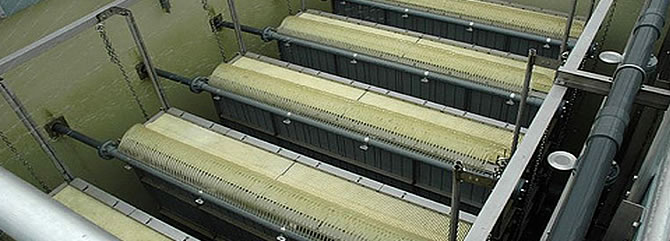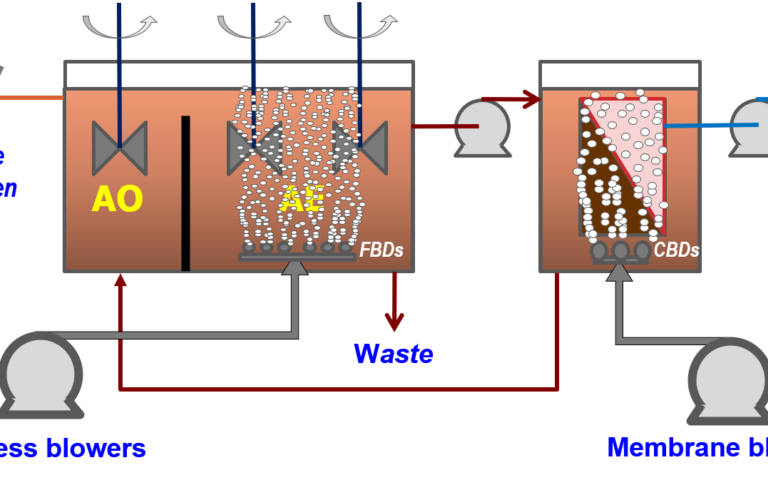How Membrane Bioreactor Can Help Meet Stringent Environmental Regulations
How Membrane Bioreactor Can Help Meet Stringent Environmental Regulations
Blog Article
The Benefits of Membrane Bioreactors in Sustainable Wastewater Administration
Membrane layer bioreactors (MBRs) represent a critical advancement in sustainable wastewater administration, efficiently combining organic treatment with advanced membrane filtration modern technology. As the need for sustainable services increases, checking out the multifaceted advantages of MBRs may expose unforeseen implications for the future of wastewater therapy systems.
Overview of Membrane Layer Bioreactors
Membrane layer bioreactors (MBRs) represent a substantial improvement in wastewater treatment innovation, incorporating biological destruction with membrane purification to enhance the effectiveness of the treatment procedure. This innovative system integrates the benefits of conventional activated sludge processes with membrane layer modern technology, permitting for boosted solid-liquid splitting up. MBRs make use of semi-permeable membrane layers to separate treated water from biomass, leading to top quality effluent that can be recycled or securely discharged into the environment.
The operational style of MBRs generally includes a bioreactor where microorganisms damage down raw material, complied with by a membrane layer unit that filterings system the combined alcohol. This configuration not only decreases the footprint of the treatment facility however likewise allows for higher biomass concentrations and lowered hydraulic retention times. Furthermore, MBRs can treating a broader array of contaminants, including nutrients and virus, making them suitable for different applications, from municipal wastewater treatment to industrial effluent processing.
The integration of MBRs into wastewater management systems is a sign of a growing pattern towards sustainable and efficient methods in environmental engineering. Their capability to create premium effluent while lessening area needs positions MBR technology as a principal in modern wastewater treatment services.
Enhanced Effluent Quality

The membrane filtering procedure functions as a physical barrier, enabling the retention of microbes and particulate matter, which adds to a more clear and cleaner effluent (Membrane Bioreactor). MBRs run at greater biomass concentrations than standard activated sludge systems, advertising more efficient biodegradation of toxins. This results in a reduction in biochemical oxygen demand (FIGURE) and overall put on hold solids (TSS) degrees in the final effluent
In addition, MBRs demonstrate superb performance in treating challenging wastewater make-ups, such as industrial effluents and wastewater with high nutrient lots. Consequently, the effluent produced is commonly of better, enabling more flexible disposal alternatives and minimized ecological effect. Ultimately, the enhanced effluent quality attained through MBR modern technology underscores its important function beforehand sustainable wastewater monitoring practices.
Water Reuse Opportunities
The high-grade effluent created by membrane layer bioreactors (MBRs) opens up considerable chances for water reuse in various my latest blog post applications. MBRs properly remove pollutants, including virus, put on hold solids, and natural issue, resulting in treated water that satisfies or surpasses governing requirements for reuse. This high quality permits the execution of water recycling initiatives throughout varied sectors.
One popular application is in farming, where dealt with wastewater can be utilized for irrigation, promoting sustainable farming practices while conserving fresh water sources. Furthermore, MBR-treated effluent can be made use of for commercial procedures such as cooling, cleaning, and as link a process water source, substantially lowering the need for potable water in these operations.
In urban environments, MBRs facilitate the use of recovered water for landscape watering, bathroom flushing, and other non-potable uses, contributing to the general strength of water systems. The combination of MBR innovation in decentralized systems aids in handling localized water demands, especially in water-scarce regions.
Reduced Ecological Effect
Exactly how can the adoption of membrane bioreactors (MBRs) contribute to a reduced ecological influence in wastewater monitoring? MBRs significantly boost the treatment effectiveness of wastewater while minimizing environmental disruptions. Membrane Bioreactor.
Moreover, MBRs run at lower hydraulic retention times contrasted to standard systems, leading to smaller sized treatment plant impacts. This portable design decreases land usage, thus preserving natural environments and biodiversity. The procedure also produces much less sludge than traditional methods, minimizing disposal challenges and reducing greenhouse gas exhausts related to sludge management.
Additionally, MBRs facilitate the healing of beneficial sources, such as water and nutrients, adding to a circular economic climate. By making it possible for water reuse for watering or industrial processes, MBRs aid relieve freshwater shortage, hence advertising lasting water use techniques. Ultimately, the adoption of MBR innovation represents a considerable stride towards decreasing the ecological influence of wastewater monitoring systems.
Financial Benefits of MBRs

In addition, MBRs promote the manufacturing of premium effluent, which can be reused for various applications, such as agricultural watering and commercial procedures - Membrane Bioreactor. This reuse capacity can dramatically lower water purchase expenses, offering a financial incentive for industries encountering rigorous water guidelines
The small design of MBR systems additionally causes lowered land needs, which is particularly valuable in urban locations where property is expensive. By reducing room, markets and towns can reduce land procurement and maintenance costs.
Furthermore, MBRs typically require much less frequent upkeep and have a longer lifespan than typical systems, additionally contributing to set you back savings. In recap, the financial advantages of MBRs-- varying from minimized operational expenses to land savings and effluent reuse-- make them an engaging option for lasting wastewater administration, offering both instant and long-term economic benefits.
Verdict
In addition, MBRs add to minimized ecological influences with small layouts and reduced sludge generation. Economic benefits additionally improve their feasibility, making MBRs an appealing option for attending to the challenges of wastewater treatment and advertising lasting resource monitoring.
Membrane bioreactors (MBRs) stand for a crucial innovation in sustainable wastewater administration, successfully merging biological treatment with innovative membrane filtration technology.Membrane bioreactors (MBRs) stand for a considerable improvement in wastewater treatment technology, incorporating organic degradation with membrane purification to improve the efficiency of the treatment procedure.Accomplishing enhanced effluent top quality is one of the most considerable benefits of utilizing membrane bioreactors (MBRs) in wastewater therapy.Furthermore, MBRs demonstrate superb efficiency in dealing with challenging wastewater make-ups, such as industrial effluents and wastewater with high nutrient loads.Incorporating membrane bioreactors (MBRs) right into wastewater administration not only lowers environmental impact yet likewise offers significant economic benefits.
Report this page